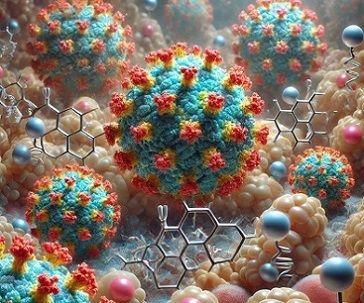Nikhil Prasad Fact checked by:Thailand Medical News Team Jul 01, 2024 1 year, 5 months, 4 weeks, 1 day, 18 hours, 26 minutes ago
COVID-19 News: COVID-19, caused by the SARS-CoV-2 virus, has been a global health crisis. While many people recover from mild to moderate symptoms, severe cases can lead to serious complications, including acute respiratory distress syndrome (ARDS) and pulmonary fibrosis (PF). These complications have driven researchers to explore new treatments and preventative measures. This
COVID-19 News report covers a new study by researchers from Kyung Hee University, Seoul-Korea that found that apigetrin, a natural compound showed potential in reducing inflammation and fibrosis caused by SARS-CoV-2.
 Apigetrin - A Potential Defender Against COVID-19 Complications
The Role of Inflammation in COVID-19
Apigetrin - A Potential Defender Against COVID-19 Complications
The Role of Inflammation in COVID-19
COVID-19 can trigger an overactive immune response known as a cytokine storm. This storm results in the release of high levels of pro-inflammatory cytokines like IL-6, IL-1β, and TNF-α, which can cause extensive lung damage and lead to ARDS. Additionally, hypoxia, or low oxygen levels, is a critical feature in severe COVID-19 cases, contributing to organ failure and death.
Hypoxia-Inducible Factor-1 Alpha (HIF-1α): A Key Player
HIF-1α is a protein that becomes active under low oxygen conditions and plays a crucial role in inflammation and immune responses. Elevated levels of HIF-1α have been observed in COVID-19 patients and are associated with severe disease outcomes. Targeting HIF-1α could be a promising strategy to mitigate the inflammatory response and reduce the severity of COVID-19 complications.
Apigetrin: A Natural Solution
Apigetrin is a flavonoid found in various plants including dandelion coffee and in Teucrium gnaphalodes, and has been known for its anti-inflammatory, antioxidant, and anticancer properties. Researchers have now turned their attention to its potential in combating COVID-19-related complications. In laboratory studies, apigetrin has shown significant promise in reducing inflammation and fibrosis caused by pseudo-SARS-CoV-2 (PSCV), a model virus used to study SARS-CoV-2 in safer lab conditions.
Study Overview: Testing Apigetrin's Effects
Researchers conducted several experiments to understand how apigetrin affects cells infected with PSCV. They used different types of cells, including MH-S (a type of lung cell), THP-1 (a type of immune cell), and MRC-5 (a type of fibroblast cell). These experiments aimed to replicate the conditions of ARDS and PF caused by SARS-CoV-2.
-Inflammation Reduction: MH-S and THP-1 cells infected with PSCV showed increased levels of inflammatory cytokines. When treated with apigetrin, these levels significantly decreased, indicating its potential to reduce inflammation.
-Fibrosis Prevention: In the PF model, MRC-5 cells treated with a conditioned medium from PSCV-infected MH-S and THP-1 cells showed increased fibrosis markers. Apigetrin treatment reduced these mark
ers, suggesting its ability to prevent fibrosis.
Blocking the Virus: How Apigetrin Works
Apigetrin was found to interfere with the virus's ability to bind to the ACE2 receptor, which is the entry point for SARS-CoV-2 into human cells. This blocking activity helps prevent the virus from infecting cells and spreading, adding another layer of protection against COVID-19.
Potential Therapeutic Uses
Given its ability to reduce inflammation, prevent fibrosis, and block viral entry, apigetrin could be a valuable addition to the arsenal of treatments for COVID-19. It offers a natural alternative to other drugs, potentially with fewer side effects. This makes it an attractive candidate for further research and development.
Conclusion: A Promising Future
The fight against COVID-19 continues, and finding effective treatments is crucial. Apigetrin's potential to target HIF-1α, reduce inflammation, and prevent fibrosis opens new avenues for managing severe COVID-19 complications. While more research is needed to confirm its efficacy in clinical settings, the initial findings are promising. Apigetrin could become a key player in reducing the burden of COVID-19 and improving patient outcomes.
Final Thoughts
As we navigate the ongoing pandemic, exploring natural compounds like apigetrin offers hope. Its multifaceted approach in tackling the virus and its complications highlights the importance of innovative research in finding solutions to global health challenges. With continued efforts, apigetrin may one day become a standard part of COVID-19 treatment protocols, helping to save lives and reduce the impact of this devastating disease.
The study findings were published in the peer reviewed journal: Scientific Reports (Nature).
https://www.nature.com/articles/s41598-024-65447-w
For the latest
COVID-19 News, keep on logging to Thailand Medica News.
Read Also:
https://www.thailandmedical.news/news/protein-from-sweet-potato-can-be-used-to-treat-covid-19
https://www.thailandmedical.news/news/mitochondrial-dysfunction-biomarkers-and-curcumin-new-hope-for-severe-covid-19
https://www.thailandmedical.news/news/medicinal-plants-for-the-management-of-post-covid-19-fatigue
